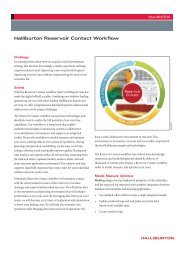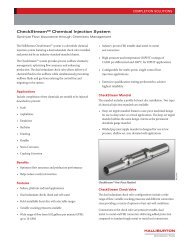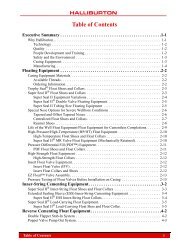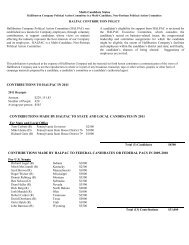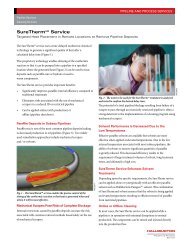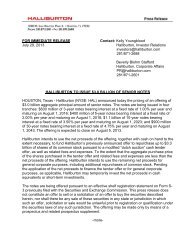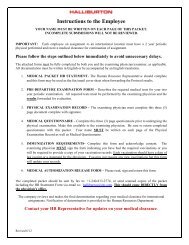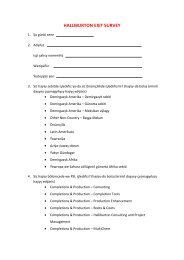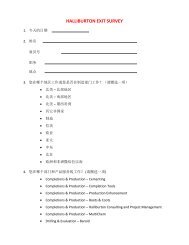COBC - Code of Business Conduct - Halliburton
COBC - Code of Business Conduct - Halliburton
COBC - Code of Business Conduct - Halliburton
You also want an ePaper? Increase the reach of your titles
YUMPU automatically turns print PDFs into web optimized ePapers that Google loves.
Fair Competition<br />
Competition Laws and Anti-Competitive Activities<br />
We are committed to competing fairly and winning<br />
business ethically and legally by delivering superior<br />
products and services in keeping with our core<br />
value <strong>of</strong> Technology Innovation. Our marketing,<br />
advertising and sales efforts must be honest and<br />
forthright, and we will refrain from making unfair<br />
or disparaging comments about our competitors and<br />
their <strong>of</strong>ferings.<br />
<strong>Halliburton</strong>’s business pursuits are regulated by<br />
various global competition laws (also called<br />
“anti-trust laws” in the U.S.) that promote fair<br />
competition by prohibiting practices or activities that<br />
unfairly restrict trade. These laws can be complex and<br />
violations can lead to significant civil penalties as well<br />
as fines and jail sentences. We must never engage in<br />
the anti-competitive behavior that competition laws<br />
prohibit, including formal or informal agreements to:<br />
• Fix or coordinate prices<br />
• Facilitate collusive bidding or bid rigging<br />
• Boycott certain customers or suppliers<br />
• Share information with competitors about prices,<br />
pr<strong>of</strong>its or pr<strong>of</strong>it margins<br />
• Divide or allocate markets, territories or<br />
customers<br />
• Exchange or share any unpublished information<br />
concerning prices or any other competitive<br />
information with a competitor<br />
• Strike reciprocal deals with partners or suppliers<br />
It is important to avoid creating even the perception<br />
that we are colluding with our competitors. Limit<br />
your interactions with competitors to the extent<br />
possible and avoid discussions about any <strong>of</strong> the<br />
topics listed above. If a competitor engages you in a<br />
conversation that concerns you, end the discussion<br />
immediately and report the incident to the Ethics &<br />
Compliance Practice Group in the Law Department<br />
as soon as possible.<br />
Can I have a drink with a competitor at a trade show and discuss the possibility <strong>of</strong> <strong>Halliburton</strong><br />
partnering with his company to bid jointly on a contract tender? Working together would<br />
increase the likelihood <strong>of</strong> us winning the deal.<br />
Be extremely cautious in any conversations with<br />
competitors. You may be violating competition<br />
laws if you share information on competitively<br />
sensitive topics, including prices, costs, fees,<br />
pr<strong>of</strong>it margins, or credit and billing practices.<br />
While competitors can work together as<br />
partners in certain instances, competition laws<br />
prohibit agreements between competitors to<br />
fix prices or to allocate customers, territories,<br />
products or services. Such agreements are<br />
illegal. You should avoid all conversations with<br />
competitors about business-related topics.<br />
Consult the Anti-Corruption & International<br />
Compliance (ACIC) Practice Group in the Law<br />
Department before you make any plans to talk<br />
with a competitor.<br />
42




